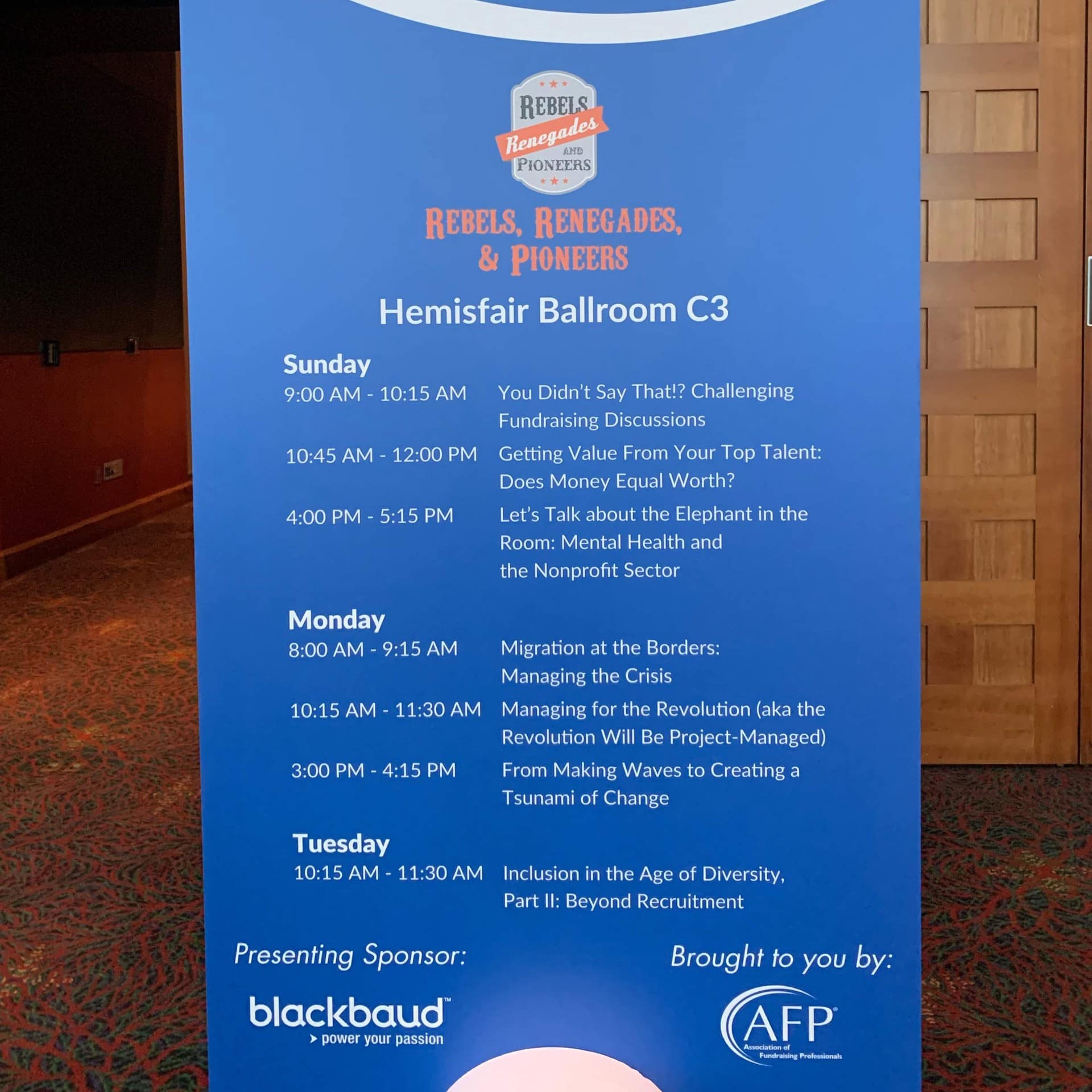Last week I attended the Association of Fundraising Professionals International Conference in San Antonio, Texas. This conference is always the highlight of conference season because it’s the biggest fundraising conference in the world plus I get to see my friends from around the world.
Aside from presenting several sessions, this year was particularly special because myself and three other wonderful volunteers curated once again the Rebels, Renegades and Pioneers track. The track is about addressing topics of social justice, race, equity, and so on. Two of the topics that I worked on and are closest to my heart were on mental health in the nonprofit sector and how nonprofits are handling the migration issue near the borders (read US and Canadian borders).
First, the mental health session. We had three very brave nonprofit professionals openly discuss their life as fundraisers living with mental illness. Their candid, brave, open, and vulnerable account of their respective lived experiences presented an honest and real view of what it’s like to suffer in silence because their work environment didn’t feel safe for them to disclose their illness.
We discussed the reasons why this is and what we can do to create safe environments for those living with mental illness. Here are a few takeaways:
- Do what is best for you – find a system that works for you and keep to that, be it having 8 hours of sleep, taking medication, eating well, refraining from alcohol, going to therapy, etc.
- Take the mental health first aid course – get trained or better yet, have everyone on staff trained
- Become an ally – open a conversation about mental health in your organization, include the board in this conversation
- Be on the look out for those struggling – the person smiling next to you could be struggling, don’t ignore the signs
- Always put your mask on first – as nonprofit professionals, we have an innate need to fix everyone around us. Take care of yourself first and then, be there for others.
The second session was on the migration issue at the Canadian and the US/Mexico border. This was probably the most heartbreaking and anger fuelled session I have ever experienced. The sheer injustice of the US system angered and upset me to no end but at the same time, it also made me proud to have a more just system in Canada. Is it a perfect system? Oh heck no! Anyone who is remotely interested and educated on the subject knows how there are many things to fix with our system and thanks to the Manitoba Interfaith Immigrant Council, asylum seekers crossing into Manitoba have a better chance at freedom.
What I found most interesting is that even if you don’t work on migrant or immigration issues, you could still pick up a few tips. Here are some of the key takeaways from the impressive panel of speakers:
- Learn to work with the media – they can be a great ally if you know how to speak with them and tell the stories of those you serve. You bear witness of what migrants and asylum seekers experience, focus on those stories and not the soundbites.
- You can’t change everyone’s minds – some people will dig their heels and refuse to go to your side, learn to discuss the issue from the angle that affects them. For instance, Nancy Santiago Negrón of Hispanics in Philanthropy shared an example where she was speaking with business owners in San Diego who resented migrants crossing over the border. Realizing she wouldn’t win them over, she shifted the narrative and asked them how they felt about their community suddenly being militarized and how that affected their business. Their dialogue changed and she knew they could now exchange on a common ground
- Be nice but firm – especially when calling out the injustice. We have a duty to call it out if we are to honourably serve clients.
- Take care of your team – if you are working in an organization whose mission is difficult emotionally, make sure to take care of yourself and your staff. Allow for down time, for laughter and for self care in whatever form that may take.
There were many more sessions that left a mark but these two are the proudest moments of my career.
I hope that by reading this you will be inspired to engage in a conversation about mental health in your organization. If you want to connect with one of the speakers, please drop me a line. I have purposely left out their names to protect their identity but they have indicated they are happy to talk to anyone about this subject.
As always, if you have questions, write to me and I’ll answer on a subsequent post on Thursday.


